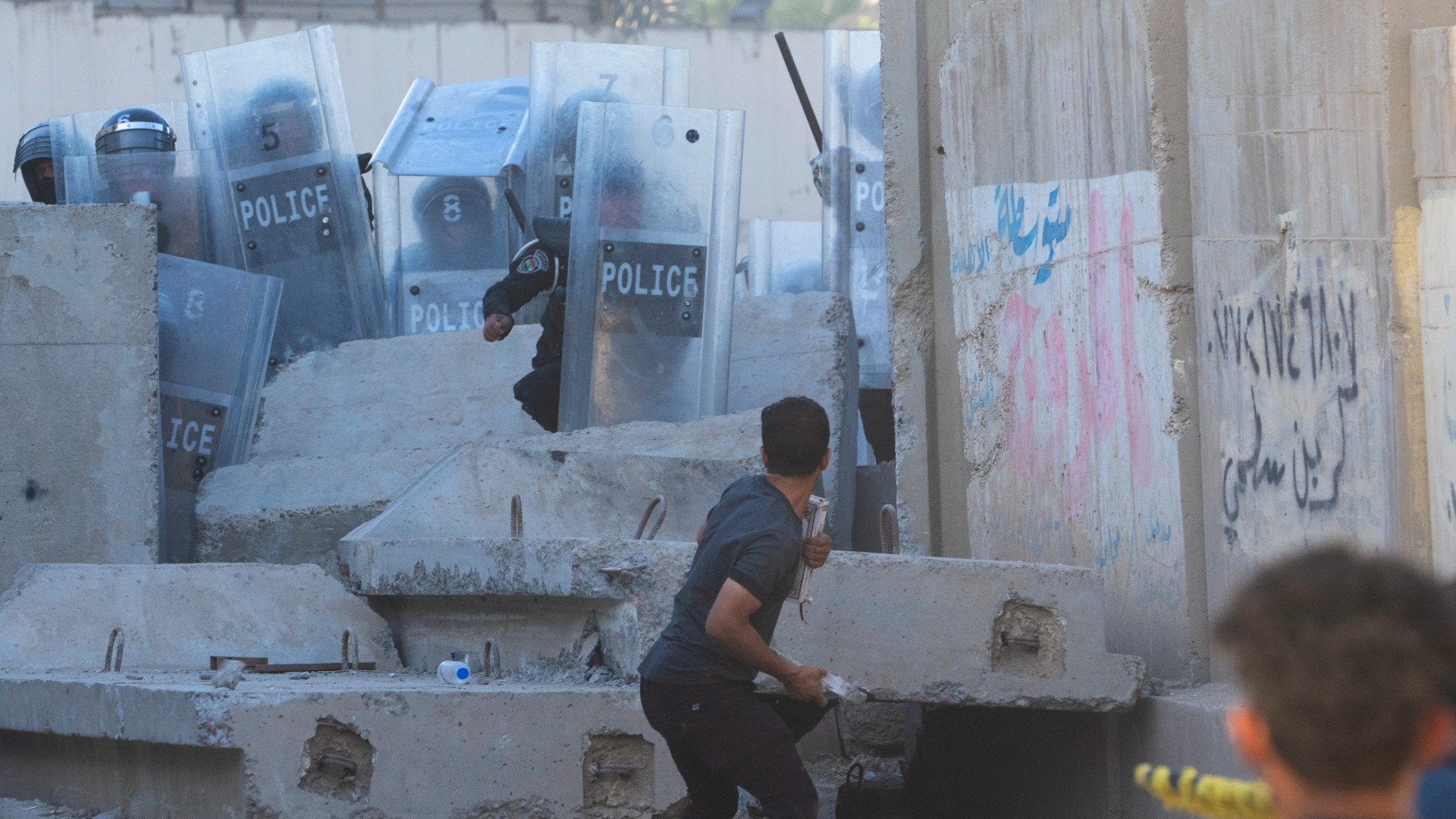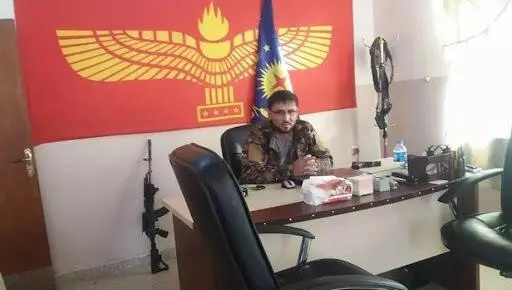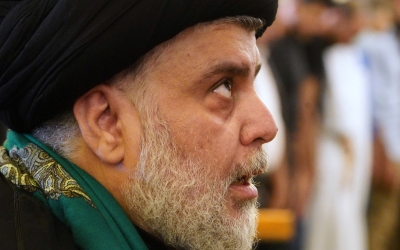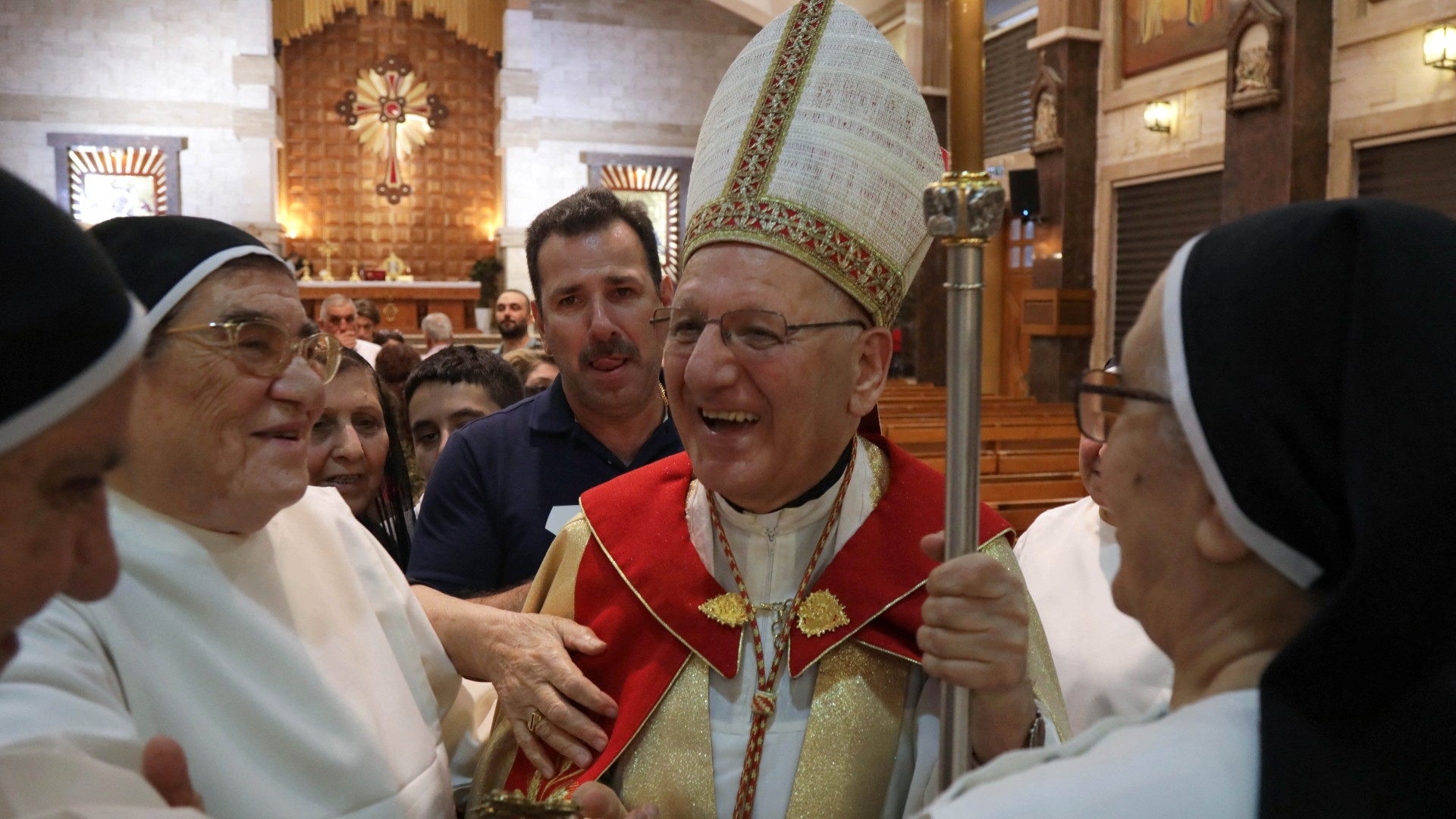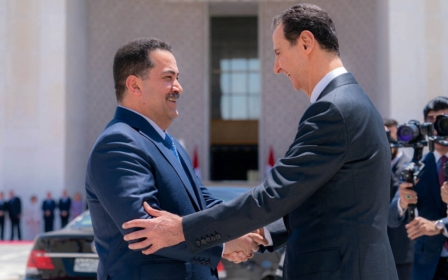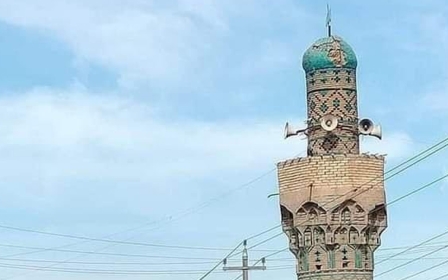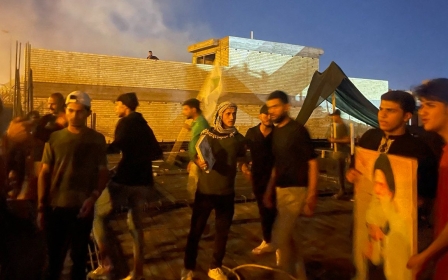Why Iraq thinks a plot is fanning the flames of its diplomatic crises
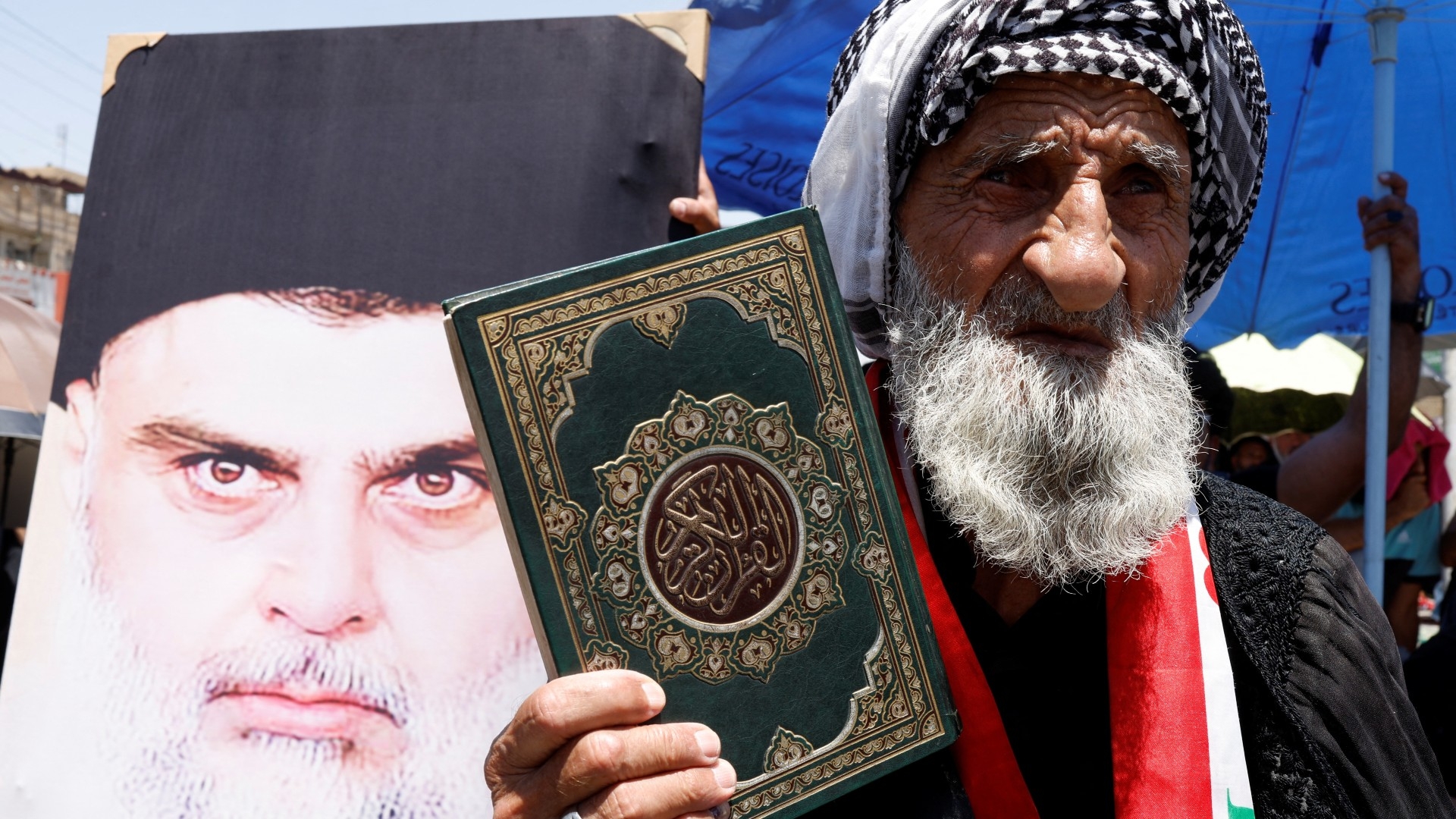
After months of relative calm, Iraq has been buffeted by a slew of controversies and crises that have taken on an international dimension. Their arrival all at once is not a coincidence, and there is a plan to destabilise the country ahead of December's provincial elections, Iraqi officials and political leaders say.
Since last week, security forces have been on high alert, with attacks on diplomatic missions and foreign interests expected in the coming weeks, security officials told Middle East Eye.
Most prominent among the recent controversies has been the expulsion of Sweden's ambassador and the storming of the Swedish embassy by followers of influential Shia cleric Muqtada al-Sadr. The Sadrists attacked the embassy on Saturday night in response to Swedish authorities giving their permission to allow someone to burn a copy of the Quran for the second time in three weeks.
Also in the Sadrists' sights that night was the Green Zone, the fortified Baghdad neighbourhood that hosts most governmental offices and embassies.
Sadr's followers tried to storm the Green Zone - where they held a months-long sit-in last year - and target the Danish embassy after a far-right group burnt the Quran and Iraq's flag outside the Iraqi mission in Copenhagen hours earlier.
Ever since, larger numbers of Iraqi security forces have been deployed in the surrounding areas and other measures tightened, security sources told MEE.
The noise coming from Iraqi officials indicate that they believe that the provocative incidents in Scandinavia are part of efforts to target their country.
President Abdel Latif Rashid described it as a "sedition plot" carried out by people living abroad and exploiting free speech laws "to implement suspicious aims against Iraq and Iraqis".
On Saturday, Rashid said "the sequence of events indicates that there is an intentional aim to provoke the Iraqis exclusively to show our country as an unsafe country for foreign missions".
He accused those responsible of seeking "to tarnish the image of a stable and secure Iraq, damage its international reputation and deprive it of cooperation with other countries".
Since then, the far-right group Danish Patriots has set fire to another Quran outside the Iraqi embassy and trampled on Iraq's flag, the fourth such incident in Denmark and Sweden within a month.
Security officials told MEE that their intelligence indicates that "something is cooking against Iraq specifically", and that this explains why the Iraqi flag is being destroyed alongside the holy text outside Iraq's embassies.
"The scenario is clear and it targets Iraq exclusively," a military commander serving in the Baghdad Operations Command told MEE.
The commander noted that all the incidents take place abroad, but the response is always felt domestically.
"We do not yet know whether it was a state or just personalities behind this scheme, but the goals are clear to us. Disturbing the security situation, paralysing the government and turning it into a goalkeeper who is concerned only with repelling attacks is the main objective," he said.
"We believe that the demonstrations will continue for one reason or another, and will be accompanied by fiercer attempts to enter the Green Zone. If the demonstrators enter this time, things will not return to their previous state."
Notably the Swedish government has also said external actors are trying to stoke the flames, indirectly accusing Russia and linking it to its recent bid to join Nato.
'Exploited and employed'
The man who ignited this rolling crisis by first burning a copy of the Quran in Stockholm in late June is Salwan Sabah Momika, a 37-year-old Iraqi Christian from the predominantly Syriac town of Hamdaniya, 15km southeast of Mosul.
He left his hometown in 2012, fleeing a three-year sentence for wrongful death, handed to him by a court after causing someone to die in a traffic accident, Iraqi security sources told MEE.
Following that, Momika disappeared for almost two years before he showed up suddenly in a video broadcast in January 2015 by the Imam Ali Brigades, an Iranian-backed Shia armed faction.
The video, which was shot in Taji military base north of Baghdad, shows a group of young Christians who joined the Brigades to fight the Islamic State group, which invaded their territory in the Nineveh Plains in the summer of 2014.
Momika is seen introducing himself as the commander of the group, which he called Kataeb Ruhallah Isa Ibn Mariam.
"With our Shia brothers, we are now ready to liberate our regions and our lands that were stolen from us," Momika says. "Either we live with our dignity or we die with our courage."
It is not clear how Momika was able to reemerge following his conviction, but the Islamic State group's takeover of northeastern Iraq appears to have made it moot.
Momika's military and political progress rocketed subsequently, but for vague reasons.
In less than two years, he became the commander of a regiment that called itself Suqur al-Suryan, which was linked to the Popular Mobilisation Authority (PMA) paramilitary umbrella organisation but not officially recognised, and founded another shadowy outfit called the Syriac Democratic Union Party.
His former commanders told MEE that Momika never stood out, and that the "only" reason he rose to senior positions was because of the relationship between his older brother Wissam and Rayan al-Kaldani, the commander of the Babylon Brigades, a Christian armed faction affiliated with the PMA.
Wissam oversaw the education ministry's Syriac and Christian storage facilities, and was a founder of the Babylon Movement, Kildani's political wing, commanders said.
Wissam ran on the Babylon Movement's electoral list in the 2014 parliamentary elections, but did not win.
In February 2017, Momika was arrested by the Popular Mobilisation's security directorate on charges of "immoral activities and extortion", a PMA official told MEE. After three days, he was released on condition that he leave Mosul and pledge never to cite the PMA in any of his dealings, the official added.
'In the second time around, Momika was executing a scenario drawn for him. It was not an angry or spontaneous reaction'
- Senior security official
Momika left for Erbil, then headed to Sweden, where he obtained temporary residency after claiming that his life was in danger.
In Stockholm, Momika was involved in numerous offences, one of which was a criminal one, where he assaulted his roommate and threatened him with a knife, Iraqi lawyers preparing to sue him in Sweden over the Quran burning told MEE.
These had gravely affected his chances of being granted permanent residence, the lawyers believe.
When Momika burned a copy of the Quran in June in front of Stockholm's central mosque, "he was seeking to provoke Muslims and lure them into threatening him, preventing the Swedish authorities from sending him back to Iraq", an Iraqi security official following up on the case told MEE.
"This is the logical explanation for the first attempt, but in the second it was different."
The next time Momika pulled such a stunt, on 21 July, he tore up a copy of the Quran and wiped his shoes with it. This time, he did it in front of the Iraqi embassy, and desecrated an Iraqi flag and an image of Sadr too.
Iraqi security officials told MEE that the initial information they received from their sources in Sweden suggested that Momika had been "exploited and employed" to do this.
Officials said they are now almost certain that there is a link between Momika and the group that burned the Quran in Copenhagen, and that they believe that the instigator was the same in both cases.
"In the second time around, Momika was executing a scenario drawn for him. It was not an angry or spontaneous reaction,'' a senior security official told MEE.
Chaos a great distraction
Security officials and politicians told MEE that whomever is behind this alleged plot must know about Iraqi leaders and the best ways to rouse them.
Sadr was the first to be provoked.
The Shia cleric has been a dominant figure in Iraqi politics, winning the 2021 parliamentary elections. But in June last year he declared his retirement from political activity and made his MPs resign after being blocked from forming a government. Since then, he has faced huge pressure from his followers and opponents alike to reenter politics.
Sadrists have since watched their Iranian-backed Shia rivals take control of the government and the international community lend its support to Prime Minister Mohammed Shia al-Sudani, much to their chagrin.
Many have begun to question Sadr's decision to boycott politics, and some have even joined his rivals.
They may have finally convinced their leader. Last month, Sadr began studying the feasibility of participating in December's provincial elections, sources told MEE.
Sadr often uses issues such as defending Islam, combatting corruption and criticising homosexuality to rally his base.
"Burning copies of the Quran in front of Iraqi embassies would provide a perfect argument for Sadr to mobilise his followers," a prominent Sadrist leader told MEE.
And the fierce reaction of Sadr and his followers went like clockwork.
Since the Sadrists first stormed the Swedish embassy in late June, they have been mobilising, particularly in Baghdad and Basra where they and their Iranian-backed rivals have the largest presence, in a "blatant challenge" to the security services and Shia armed factions linked to the government.
Sadr's followers did not wait for Momika to carry out his threat the second time, and stormed the embassy the night before the Quran was burnt.
Sadr's opponents accused him of "exploiting" the event to position himself as the "defender" of the Quran and Islam.
But Sadrist leaders claimed that the storming (twice) of the Swedish embassy building, the recent attack on the headquarters of Sadr's opponents in the central and southern governorates, and the attempt to get into the Green Zone to reach the Danish embassy are all "unplanned and spontaneous reactions" carried out by Sadr's followers without his direction.
"Why don't you believe that he does not issue such orders? We know how he thinks and we read between the lines of what he publishes," a commander of Saraya al-Salam, Sadr's armed wing, told MEE.
"Usually, we move to do something. If he remains silent and does not comment, we proceed with what we do. If he asked us to stop, we would stop."
Two prominent Sadrist leaders did not deny that Sadr had exploited the event "to distract his followers and disturb his opponents", as they put it.
"Let's first admit that he is very smart" and good at utilising such moments, one of the leaders said.
"Yes, he took advantage of the event to [allow] our youth [the opportunity] to vent the tensions they have been suffering from since last June and to divert their attention away from the provincial councils elections," the leader said.
"Our youth are frustrated and feel that they have been marginalised and that Sadr was forced to withdraw from the political process, so they are looking for any opportunity for revenge. Sadr provided them with the opportunity to vent these feelings and at the same time [reminded] his opponents that he is [still] here and that he still has the final word in the Iraqi arena."
International dissatisfaction
There's no doubt that Sadr has the manpower and resources to create chaos in Iraq. But he's not the only person capable of this, nor is he believed to be the main figure driving these events, according to one of Sudani's advisers.
The adviser pointed to several recent issues that have brought international pressure on Iraq, including the disappearance of Israeli-Russian researcher Elizabeth Tsurkov, a row over the Patriarch of the Chaldean Church Cardinal Daniel Raphael Sako, and the looming elections.
"We don't yet know whether what is happening is related to the case of the kidnapped Israeli or the case of Patriarch Sako, or the provincial councils elections," the adviser told MEE.
"We are currently investigating all of these possibilities and have not ruled out any of them."
The adviser said that the international community has begun dialling pressure up on Iraq following the latest developments, and is losing confidence in Sudani's government.
He added that the government will need time to seriously tackle each issue to regain the international community's confidence.
Tsurkov, who entered Iraq with her Russian passport last year, was kidnapped in Baghdad in March.
'We don't yet know whether what is happening is related to the case of the kidnapped Israeli or the case of Patriarch Sako'
- Advisor to Sudani
Israeli authorities accused Kataeib Hezbollah, the Shia armed faction most involved in intelligence issues. The Iraqi government initially distanced itself from the issue and "chose not to interfere", Sudani's advisor said, although it promised to investigate the matter last month.
Meanwhile, western countries have been dragged into another drama: the crisis over the Chaldean Church.
In early July, the president stripped its patriarch, Cardinal Sako, of executive powers to manage the church's property. This, a western diplomat told MEE, represents another serious challenge to Sudani.
Rashid said the withdrawal of his presidential decree was aimed at "correcting a constitutional situation".
However, most Iraqi Christians at home and abroad saw the decision as an attack on them and their symbols, and that it represented an unjustified "interference" by Rashid into their private affairs.
Several European ambassadors in Baghdad expressed their dismay over the decision in private.
The Apostolic Nunciature to Iraq, which represents the Vatican in Baghdad, issued a statement calling it inappropriate and the result of "biased and misleading" reports. The Chaldean Church is affiliated with the Catholic Church and its patriarchs are made cardinals.
Meanwhile, the US State Department described the decision as a "blow to religious freedom".
"We are concerned that the cardinal's position as a respected leader of the Church is under attack from a number of quarters, particularly a militia leader who is sanctioned under the Global Magnitsky Act," a State Department spokesperson said.
In a mass he held in Erbil on Sunday, Sako said that the president's decision was "insidious, political, and moody" and issued "under the influence of the Babylon militia".
The militia leader alluded to by the State Department and Sako is none other than Kildani, leader of the Babylon Brigades, who has been subject to US sanctions since 2019 for his involvement in "gross violations of human rights" in the Nineveh Plains during the fight against IS.
Sako has previously publicly accused Kildani of seizing the property of displaced Christians in Christian towns in the Nineveh Plains and in Baghdad. He has also accused Kildani of seizing church property and assuming governmental offices reserved for Chaldeans, with the help of his allies in the Iranian-backed armed factions.
"The chaos at this time, the person responsible for it and the targeting of diplomatic missions, all serve as excellent distractions for the international community and government" from the controversy over Sako, Sudani's adviser said.
"Regardless of the president's motives for withdrawing Sako's decree, it was an ill-conceived decision that put the Sudani government in a tough position," he added.
"Revocation of the decree in the first place was a mistake, it embarrassed us. And retracting it now will embarrass the president and call into question all his previous and subsequent decisions."
Postponing the elections
December's provincial council elections are set to shake up Iraqi politics and redraw the map of influence in Baghdad and other provinces.
Many Shia and Sunni political forces are expected to lose their influence in favour of others that have recently been ascendant.
Provincial councils haven't been functioning since 2019, when they were abolished in response to the Tishreen protest movement. But resuming their work would allow political parties to secure access to hundreds of millions of dollars and millions of electoral votes.
Whoever wins the largest number of seats will play a pivotal role in formulating the upcoming political and parliamentary alliances.
If the polls are held on schedule, Sadr and Parliament Speaker Muhammad al-Halbousi are set to be the biggest losers. By urging his followers not to participate in the elections, Sadr will naturally lose ground. Sunni leader Halbousi, meanwhile, is vulnerable after a shifting of alliances in Iraqi politics.
Qais Khazali, leader of the Iranian-backed armed faction Asaib Ahl al-Haq, is expected to do well.
The other Shia and Sunni traditional political forces "do not seem enthusiastic" about holding the elections on time, said a leader in the Coordination Framework, the pro-Iran Shia political alliance that now dominates the Iraqi government.
Since getting in power, a degree of disunity has been seen among Framework parties, rivalry which will see them run on three separate electoral lists.
The first will include Asaib Ahl al-Haq, the Badr Organization led by Hadi al-Amiri and Ammar al-Hakim's Hikma Movement. The State of Law and the Islamic Fadhila Party will participate in another list, while the Sanad bloc led by Labour Minister Ahmad al-Asadi and the Supreme Islamic Council, led by Hammam Hamoudiwill, will run on a third.
It is not yet clear what the Sunni parties' alliances will look like. As for the Kurdish parties, their impact will be limited to the situation within the semi-autonomous Kurdistan region, and various disputes between them are still being worked through, so their electoral lists are yet to be solidified.
Sudani and Kataeb Hezbollah will not participate in these elections, sources said.
"Everyone knows that the biggest winner in these elections will be Khazali, so they are not enthusiastic about holding them on time," a Shia leader told MEE.
"There is a real fear of his encroachment in the absence of the Sadrists. There is an unspoken desire to postpone the elections in the hope that the situation will change in the future, but no one dares to speak about it publicly."
However, Sudani's adviser said that "the Iraqi scene, as usual, is full of many complications and dozens of players, local and international", and that they "would not be surprised" if they found that "one of these players was behind the game of burning copies of the Quran in front of the Iraqi embassies".
"The goal is to pressure and manipulate the Iraqi government and some key political leaders. So far the target was achieved," he added.
Middle East Eye propose une couverture et une analyse indépendantes et incomparables du Moyen-Orient, de l’Afrique du Nord et d’autres régions du monde. Pour en savoir plus sur la reprise de ce contenu et les frais qui s’appliquent, veuillez remplir ce formulaire [en anglais]. Pour en savoir plus sur MEE, cliquez ici [en anglais].


